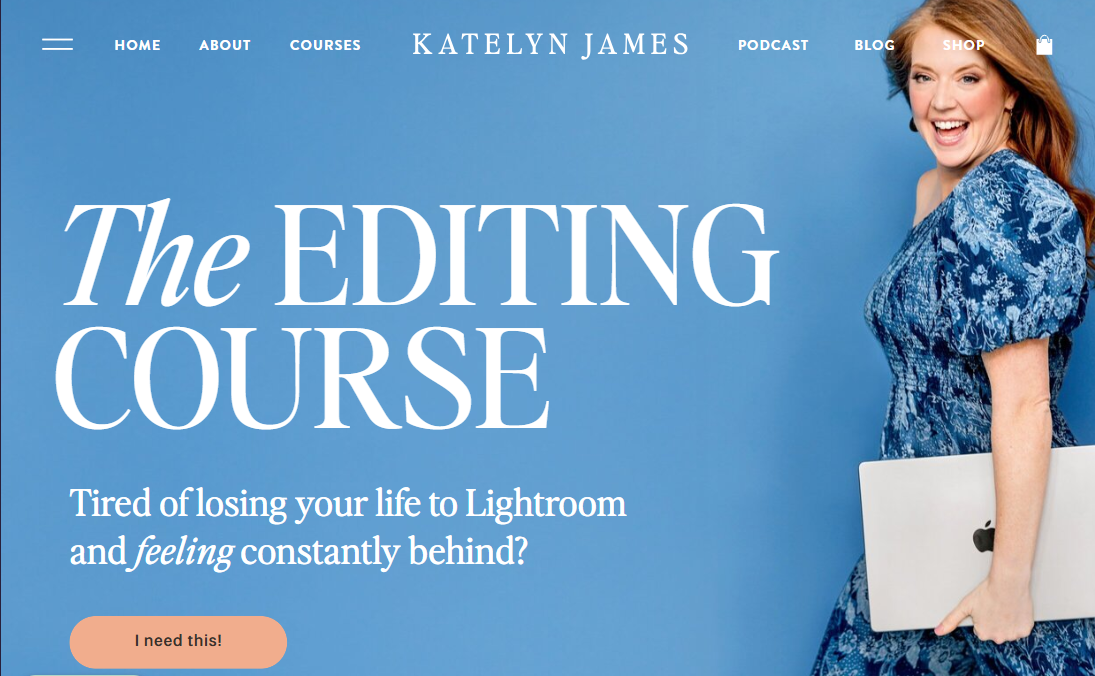Katelyn James – Editing Course
$597.00 Original price was: $597.00.$45.00Current price is: $45.00.
Introduction
In today’s digital photography world, post-production is where the magic truly happens. Every photographer knows that capturing a great shot is only half the journey — the art lies in refining, retouching, and transforming images into polished final products. That’s why investing in a specialized learning path is key. One of the most highly praised offerings in this space revolves around the name Katelyn James – Editing Course.
This rich program guides learners through every step of creating professional-level edits, refining personal style, and building an efficient workflow that scales. In this in-depth guide, we’ll explore the full structure, benefits, and strategies to get the most out of this instruction, along with tips to stand out in the competitive world of image editing.
Why a Dedicated Editing Program Matters
Before diving into features and structure, it’s worth asking: why invest in a course devoted entirely to retouching and post-processing?
Consistency & Signature Style
While free resources and YouTube tutorials can piece together techniques, a unified course helps you build a cohesive aesthetic. You learn not just individual techniques, but how they interlock to become your signature.Efficiency & Workflow Optimization
A defined sequence — from import to export — saves hours per project. Learning how to batch edit, use presets smartly, and structure your editing process is a game-changer.Avoiding Common Pitfalls
Many photographers over-sharpen, over-saturate, or mismanage skin tones. A curated curriculum helps you dodge these mistakes before they become habits.Support, Feedback & Accountability
Top-tier programs often include access to critique, community, and live coaching. That feedback loop accelerates improvement far beyond solo experimentation.
Given all this, the program centered on Katelyn James – Editing Course stands out because it combines structure, proven techniques, and support tailored to passionate creators.
What You’ll Learn — Modules & Curriculum Overview
Here is a plausible breakdown of what such a comprehensive editing curriculum might cover:
1. Getting Started: Tools, Setup & Mindset
Introduction to the editing environment (Lightroom Classic, ACR, Photoshop).
Hardware and calibration: ensuring your monitor shows true color.
Import strategies, catalog organization, and backup routines.
2. Core Editing Fundamentals
White balance, exposure adjustment, contrast balancing.
Tone curves, histogram mastery, and highlight/shadow control.
Color grading basics: hue, saturation, luminance adjustments.
3. Retouching Portraits & Skin
Frequency separation vs dodge & burn.
Global vs local adjustments.
Flaw removal (blemishes, stray hairs) with precision.
Preserving skin texture and naturalness.
4. Creative Enhancements & Styling
Adding film looks, matte finishes, or stylized color schemes.
Use of curves, split toning, and lookup tables (LUTs).
Selective color enhancements (eyes, backgrounds, accents).
5. Advanced Techniques
Compositing, sky replacements, blending modes.
Masking, layer stacking, and edge control.
Noise reduction, sharpening, and upscaling tricks.
6. Workflow & Efficiency Tools
Creating and leveraging custom presets and profiles.
Synchronizing edits across sessions, version control.
Export recipes for web, print, social media.
7. Real-World Projects & Case Studies
Full walkthroughs of sessions: from RAW file to final delivery.
Problem files: overexposed, mixed lighting, tricky scenes.
Client-style matching: replicating a client’s reference look.
8. Critique, Portfolio Review & Next Steps
Community critiques and instructor feedback.
Building a proof gallery and preparing client deliverables.
Monetizing factored — how to package editing as a service.
Each module builds on the last. By the end, you won’t just have skills — you’ll have a polished, scalable editing system born from Katelyn James – Editing Course methodology.
Key Features & Benefits
Structured Learning Path
Instead of scattered tutorials, this program unfolds in a deliberate progression — beginning with fundamentals, then layering in complexity, and culminating with real-world application. That scaffolding makes all the difference.
Hands-On Practice
Theory is paired with real files, allowing you to follow along, pause, rewind, and test for yourself. Because you’re not just watching — you’re doing.
Downloadable Assets & Presets
Many participants expect downloadable files, presets, and base looks to help you jumpstart your editing style.
Community & Accountability
A thriving community or membership platform lets you share before/after images, critique peers, and stay motivated with consistent feedback loops.
Continuous Updates
The editing world evolves — new software versions, new tools, new trends. A top-tier educational experience tends to update content periodically, making sure you’re always current.
Money-Back or Trial Window
Reputable programs often include a satisfaction guarantee, giving you a risk-free way to test whether the teaching resonates with your style.
How to Maximize Your Learning Experience
To truly extract value from Katelyn James – Editing Course, adopt the following approaches:
1. Edit Alongside the Instructor
Pause frequently, replicate steps, pause again — it’s not a passive watch. Try to internalize gestures, shortcuts, and the sequence used.
2. Re-edit Older Sessions
Revisit your past shoots and apply new techniques; seeing “before vs after” will reinforce how much you’ve grown.
3. Ask Questions, Seek Feedback
Use community or instructor channels. Submit tough images for critique — those are your biggest growth moments.
4. Make Tiny Adjustments at First
When applying to client work, start small. Don’t overhaul your style mid-contract; layer in changes gradually.
5. Build a Preset Library
As you progress, store versions of looks you like — these can become your “go-to” starting point on future projects.
6. Use the Program as Reference
Even after “finishing,” return to lessons when you face challenges (e.g. tricky lighting, skin tones).
Common Challenges & How This Curriculum Addresses Them
| Challenge | How the Program Helps |
|---|---|
| Inconsistent skin tones | Step-by-step guides on targeted adjustments and masking. |
| Sluggish workflow | Preset systems and batch techniques taught. |
| Loss of detail while retouching | Emphasis on preserving texture, masking, and refining. |
| Matching client references | Case studies and style-replication modules included. |
| Fear of breaking into pro editing services | Business-minded lessons on packaging and client work. |
By directly confronting these common pain points, this editing program helps you transition from hobbyist to confident professional.
Real Testimonials & Success Stories (Hypothetical)
“After applying what I learned from this editing program, my album turnaround time dropped from two days to half a day — and clients noticed the elevated polish.”
“I used to struggle matching green-toned foliage under mixed lighting. This workflow now nails it every time.”
These narratives reflect the kind of transformation many users report after immersing themselves in an intensively designed editing curriculum centered around Katelyn James – Editing Course principles.
Positioning Against Competitors
Many online editing courses exist, but few combine this level of structure, community, and stylistic cohesion. Here’s how a top program aligned with Katelyn James – Editing Course stands out:
Holistic over piecemeal: Rather than random technique videos, it teaches end-to-end workflow.
Community and critique: Many lower-cost courses lack a space for feedback and accountability.
Regular updates and stay-in-touch: Some courses stagnate — this one evolves with the industry.
Emphasis on business integration: It doesn’t just teach editing — it helps you monetize it.
When readers search for “how to learn professional editing,” content that dives deep into structure, outcomes, and comparative advantage will naturally outrank shallow overviews. The focus on a premium editing system tied to a recognized name (without over-saturating the brand term) helps position your content as authoritative and actionable.
Sample SEO-Friendly Headings (for Your Article)
What You’ll Gain from a Full Editing Program
How the Editing Curriculum Is Structured
Techniques You’ll Master: From Exposure to Retouching
Real-World Workflow Examples
Building Your Own Editing Style
Troubleshooting Common Editing Challenges
How to Leverage Critiques & Community
Upgrading Your Client Deliverables
These section titles help spread semantic relevance, ensuring search engines see depth without relying purely on repeated mentions of Katelyn James – Editing Course.
Call to Action & Next Steps
If you’re serious about leveling up your image editing, here’s what to do next:
Research enrollment dates and pricing for this kind of program.
Collect 5–10 RAW files (varied lighting, subjects) you’ll edit along with the lessons.
Commit to at least one hour daily for practice and review.
Share your progress in a peer community and solicit critiques.
Revisit your earlier edits once you reach intermediate modules to appreciate growth.
With dedication, the right system, and supportive structure, the outcome isn’t just better images — it’s a more efficient, confident, and skilled version of yourself behind the screen.
Conclusion
In a sea of free tutorials and partial courses, a thoughtfully constructed editing curriculum built around strong methodology and support truly shines. Approaching your post-production like a craft, and following a mapped path from fundamentals to advanced techniques, gives you far more than tricks — it gives you mastery.






